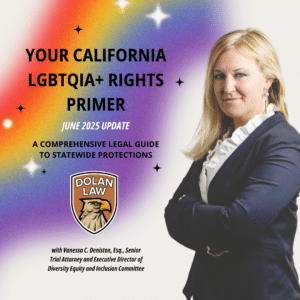By Christopher B. Dolan and Jeremy M. Jessup
Mr. Davis from San Francisco wrote in to say:
Q: “I have read a lot about, and unfortunately seen, way too many ‘Karens.’ Now I see that San Francisco Supervisor Shamann Walton has introduced an ordinance that is being called the ‘CAREN’ Act. What is this?”
A: “Karen,” of course, is a generic name given to people, usually middle-aged, middle class white women, who act like they can get whatever they want. A “Karen” is one who throws a tantrum at a Starbucks or who asks to speak to the manager over the slightest inconvenience. It is also someone who feels it is necessary to call the police to make false or inaccurate claims about minorities with racially or discriminatory motives.
The 2020 George Floyd protests have brought forth a wave of “Karens” who have been filmed engaging in racist and sometimes violent behavior against minorities. Recently, a “Karen” in San Francisco went viral for dialing police on a local Filipino resident who was stenciling Black Lives Matter in chalk on his own property. Another “Karen” was videoed telling a family that they could not be in the country because they were hiking on Mount Tamalpais with their dog.
Currently, there is immunity from civil defamation lawsuits for reporting a crime. It has been held that someone who makes a statement to the police about a suspected crime is protected by qualified privilege; he or she is discharging their social duty to help in the detection of criminal activity. A police officer receiving the report has an interest in receiving the information because they can investigate. Although reporting a false police report is criminal under California law, there is no punishment for people who call the police due to a perceived threat, based solely on one’s race, ethnicity or religious affiliation. This is where the anti-“Karen,” also known as the CAREN Act, comes into play.
The Caution Against Racially Exploitative Non-Emergencies, or CAREN Act, would amend the San Francisco Police Code, making it unlawful to fabricate or make false emergency reports that are racially biased. For example, claiming a black man is threatening you simply because he asked that you put your dog on a leash, or calling the police because a black man was dancing and exercising on his street, so as not to block the sidewalk, could be prosecuted, both civilly and criminally.
This proposed new law aims to protect the rights of minorities who are often targeted by and victims of fraudulent emergency calls. The CAREN Act would make it unlawful for an individual to contact the police solely to discriminate on the basis of a person’s race, ethnicity, religious affiliation, gender, sexual orientation or gender identity. This proposed ordinance follows similar proposed state legislation that would seek to end discriminatory police calls by classifying them as hate crimes.
Those found in violation of the state and/or local laws could be held accountable through monetary fines. In addition, under the proposed state bill, a victim of a discriminatory call could sue the caller for up to $10,000 in damages.
According to the author of the bill, California State Assemblymember Rob Bonta of Oakland, his proposal does not seek to discourage people from calling 911 to report real emergencies.
However, “racist and discriminatory 911 calls are dangerous, demeaning and demoralizing to the person falsely accused. They further deteriorate community-police relations and contribute to the inaccurate and harmful over-criminalization of black and brown communities,” Bonta said in a statement. “If you are afraid of a Black family barbecuing in the community park, a man dancing and doing his normal exercise routine in the bike lane, or someone who asks you to comply with dog leash laws in a park, and your immediate response is to call the police, the real problem is with your own personal prejudice,” said Bonita.










